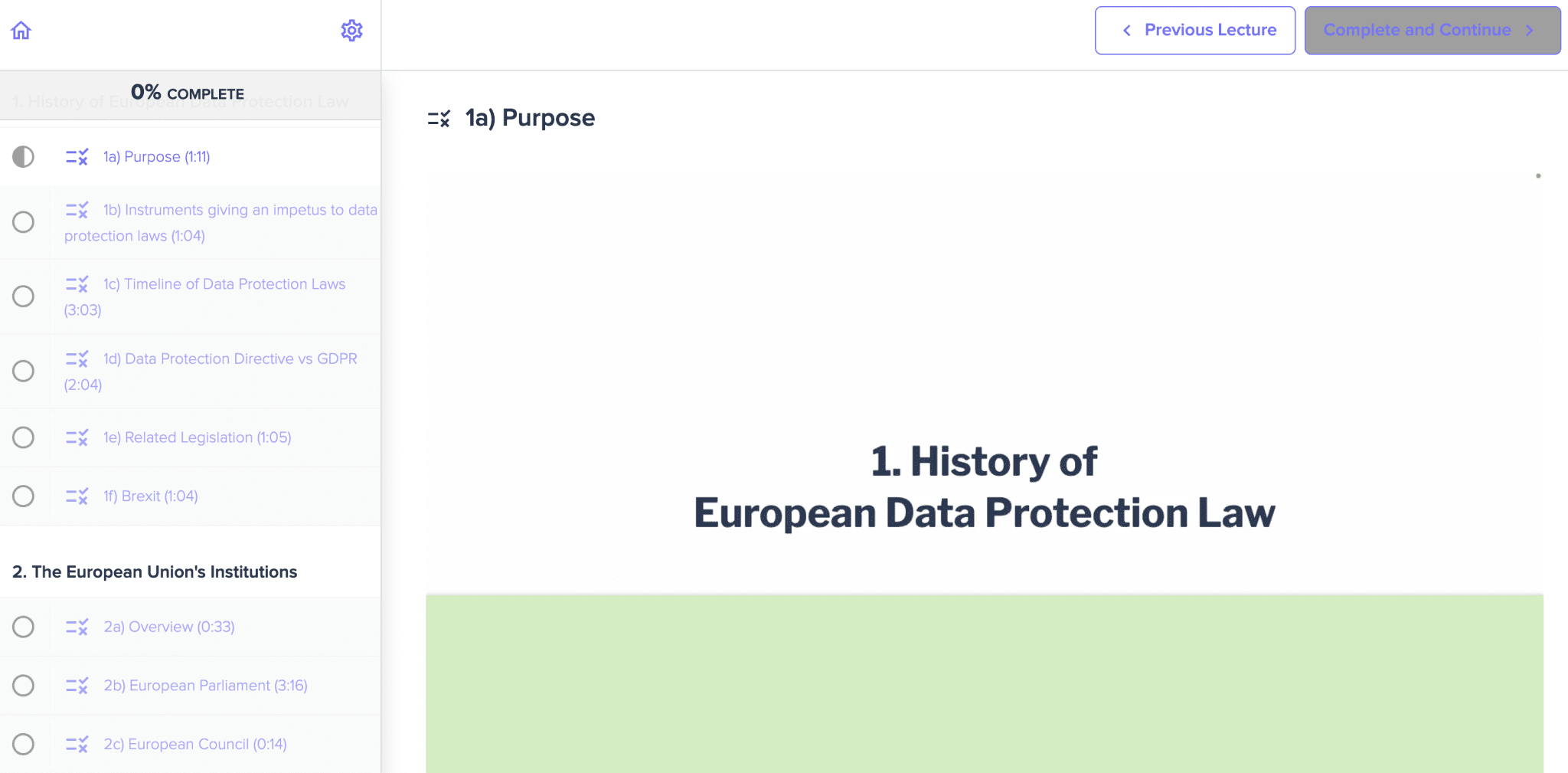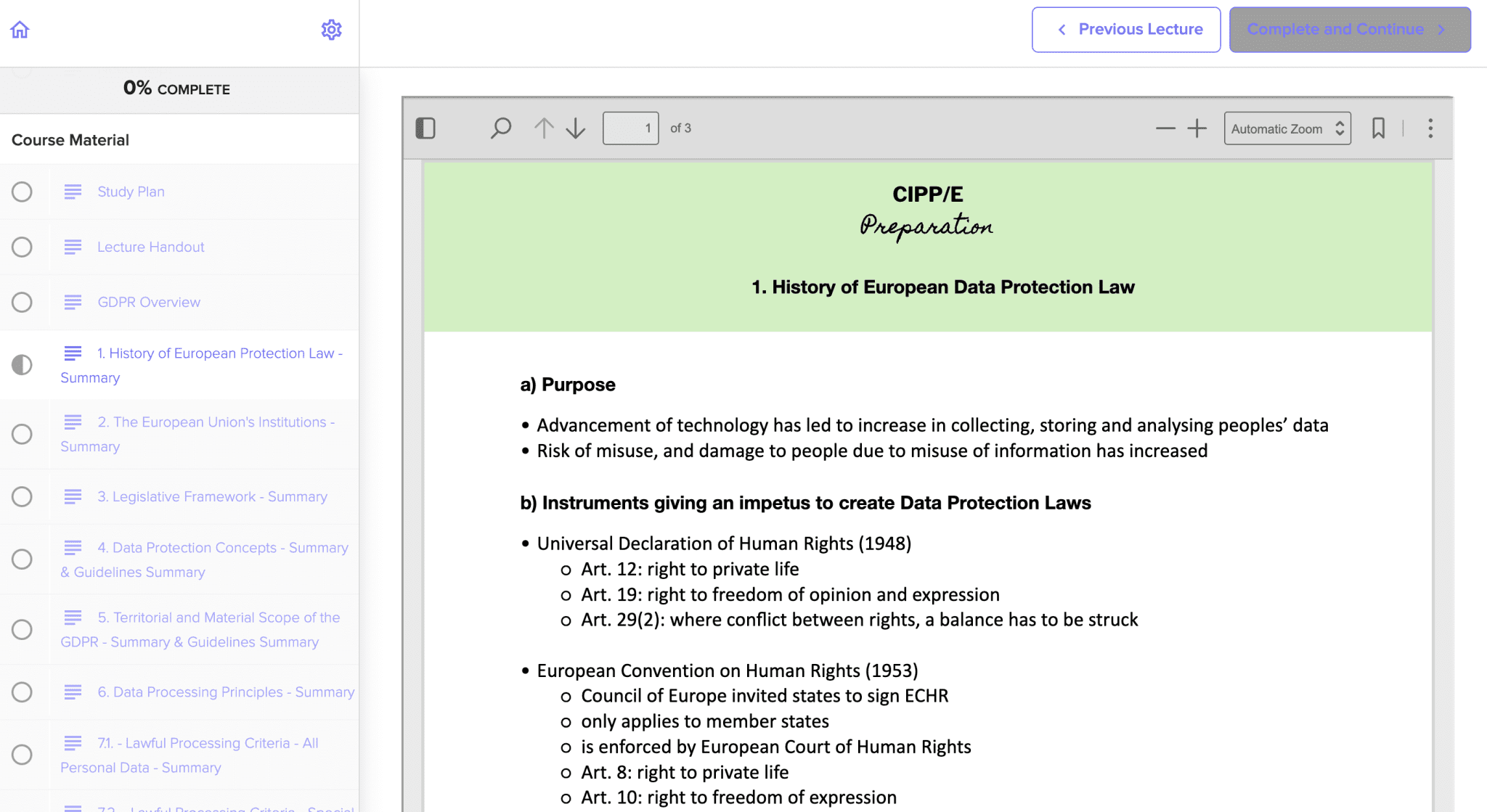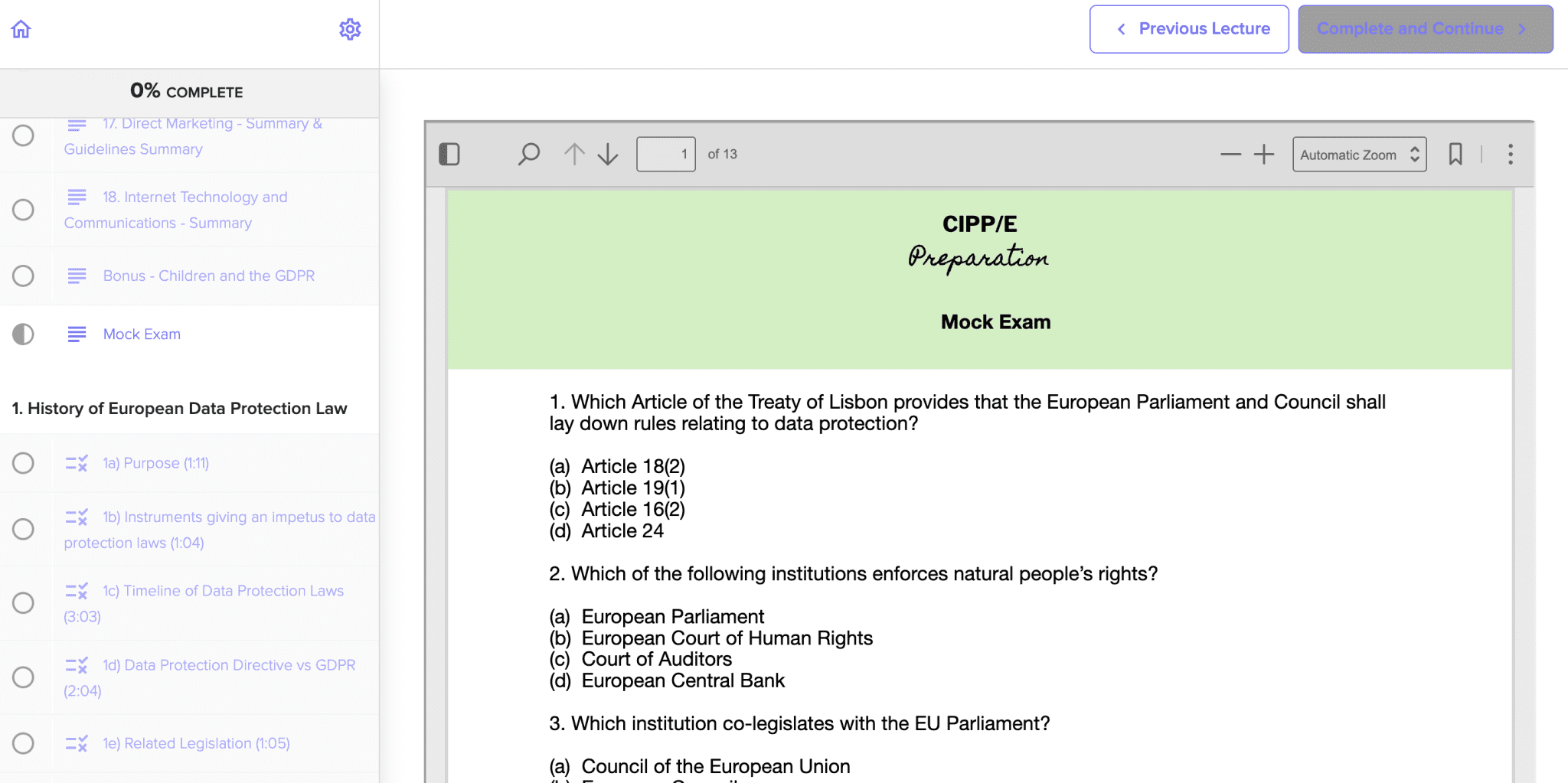CIPP/E
Preparation
Become ready for the CIPP/E

The best way to prepare for the CIPP/E
This course is specifically created for busy professionals that are looking to pass the CIPP/E as quickly and with as little hassle as possible. If you feel like you don’t know where to start with your preparation, or are exhausted from reading the tons of GDPR material, then this course is for you.
I’ll walk you through the entire material and provide you with short and accessible summaries and lectures. Say goodbye to having to work it out all by yourself and let an experienced legal professional with data protection experience help you prepare with ease.
After this course, students will be able to
- Know and understand the core concepts of the GDPR, and
- Be ready to sit the CIPP/E.
CIPP/E Preparation
contains the most important things you need to pass the exam, including:
Lectures
Short, self-paced, bite-sized videos explaining the most important concepts, followed by short practice questions.
Revision Notes
Short summaries of the most important information contained in each module and the guidelines that will save you hours of making your own notes.
Mock Exam
One full-length 90-question PDF downloadable mock exam that will prepare you for the actual exam and help you pass with confidence.
For a pre-view of a lecture, click here.
For a pre-view of a revision note, click here.
For an excerpt of free practice questions, click here.
Your can get a pre-view of what the course looks like inside here
IMPORTANT: The only thing I would recommend getting in addition to CIPP/E preparation is the recommended textbook, "European Data Protection, Second Edition" by Eduardo Ustaran.
How is CIPP/E Preparation different?
Comprehensive materials covering the IAPP body of knowledge
Money-back guarantee*
Personal Support
via e-mail and chat (subject to availability).
*You have up to 7 days from the date of purchase to change your mind. You will be refunded - no questions asked.
What does CIPP/E Preparation cover?
CIPP/E Preparation is closely aligned to the official IAPP body of knowledge, so that you are fully prepared for the exam. Here is an exact breakdown of what each module of CIPP/E Preparation contains:
a) Purpose
b) Instruments giving an impetus to create Data Protection Laws
c) Timeline of Data Protection Laws
d) Data Protection Directive vs General Data Protection Regulation
e) Related Legislation & Instruments
f) Brexit
a) Overview
b) European Parliament (“EP”)
c) European Council
d) Council of the European Union
e) European Commission
f) Court of Justice of the European Union
a) Overview
b) Council of Europe Convention (Convention 108)
c) Data Protection Directive
d) General Data Protection Regulation
e) Law Enforcement Data Protection Directive
f) Privacy and Electronic Communications Directive
g) EU Directive on Electronic Commerce
h) Directive on Security of Network and Information Systems
i) Data Retention Directive
a) Personal Data
b) Sensitive personal data
c) Processing
d) Controller
e) Processor
f) Data Subject
Summary of Guidelines 07:2020 on the concepts of controller and processor in the GDPR
a) Territorial Scope
b) Material scope
Summary of Guidelines 3:2018 on the territorial scope of the GDPR - Art. 3
a) Introduction
b) Lawfulness, fairness and transparency
c) Purpose limitation
d) Data minimisation
e) Accuracy
f) Storage limitation
g) Integrity and confidentiality
7.1. Lawful Processing Criteria
a) Introduction
b) Consent
c) Contractual necessity
d) Legal obligation
e) Vital interests
f) Public interests
g) Legitimate interests
7.2. Lawful Processing Criteria - Special Categories of Personal Data
a) Introduction
b) Explicit consent
c) Legal obligations under employment/social protection law
d) Vital interests
e) Legitimate activity of a not-for-profit body
f) Publicly available
g) Legal claim
h) Substantial public interest
i) Medical purpose
j) Public health
k) Public interest, scientific or historical research purposes, or statistical purposes
a) Introduction
b) Article 13
c) Article 14
d) When additional information must be provided
e) When and how
f) Fair processing notices
g) Exemptions
a) Introduction
b) Right of access (Art. 15)
c) Right to rectification (Art. 16)
d) Right to erasure (Art. 17)
e) Right to restriction of processing (Art. 18)
f) Notification obligation regarding rectification or erasure of personal data or restriction of processing (Art. 19)
g) Right to data portability (Art. 20)
h) Right to object (Art. 21)
i) Right to not be subject to automated decision-making (Art. 22)
Summaries of
- Guidelines 52019 on the criteria of the Right to be Forgotten in the search engines cases under the GDPR
- Guidelines 10:2020 on restrictions under Article 23 GDPR
a) Introduction
b) Appropriate technical and organisational measures
c) Breach Notification
d) Vendor Management
e) Data Sharing
a) Introduction
b) Responsibility of controllers
c) Article 25 - Data protection by design and by default
d) Record keeping and co-operation with regulators
e) Data protection impact assessment
f) Data protection officer
g) Auditing of privacy programs
a) Introduction
b) What is a transfer?
c) Adequacy Decisions
d) Adequate Safeguards
e) Derogations
f) Transfers to the US
g) Transfer Impact Assessments
Summaries of
- Guidelines 05:2021 on the Interplay between the application of Article 3 and the provisions on international transfers as per Chapter V of the GDPR
- Guidelines 04:2021 on codes of conduct as tools for transfers
- Guidelines 02:2018 on derogations of Article 49 under Regulation 2016:679
- Recommendations 01:2020 on measures that supplement transfer tools to ensure compliance with the EU level of protection of personal data
a) Introduction
b) Self-regulation
c) Data subject rights
d) Regulator supervision
e) International cooperation
a) Introduction
b) Process and procedures
c) Fines
d) Data Subject Compensation
e) Class Actions
a) Introduction
b) Legal basis for processing of employee data
c) Storage of personnel records
d) Workplace monitoring and data loss prevention
e) EU Works councils
f) Whistleblowing systems
g) ‘Bring your own device’ (BYOD) programs
a) Introduction
b) Regulation of surveillance
c) Communications surveillance
d) Video surveillance
e) Biometric data/facial recognition
f) Location data
Summary of Guidelines 3:2019 on processing of personal data through video devices
a) Introduction
b) Regulation of direct marketing
c) Specific types of marketing +
Summary of Guidelines 8:2020 on the targeting of social media use
a) Introduction
b) Cloud computing
c) Cookies
d) Search engines
e) Social networking services (SNS)
f) Artificial Intelligence
Why do I need a preparation course?
When I started preparing for the CIPP/E in October 2021, I searched for a long time for an affordable preparation course. I work full time and really struggled with concentrating on just the textbook chapters after a long day at work. I just wanted someone to tell me what I needed to know.
I couldn't find any course that fit my budget and contained what I was looking for, so I painfully researched the contents of the GDPR and material required. It took forever to read, summarise and understand.
I passed on my first attempt, but I know many others that didn't and had to pay extra to re-sit.
I really want to save others the pain of having to go through the material so inefficiently, and spending hour having to work out what is necessary and what isn't.
That is what inspired me to build this course. Trust me - this course contains everything I wish I had when I was studying for the CIPP/E.
I would have killed for having this course (seriously!)
Save Time.
Going through the CIPP/E textbook and the GDPR without any guidance is time-consuming. If you work full time, it helps so much to have all the material laid out.
Save Money.
Doing resits can be a costly exercise - with a prep course, you are more likely to pass first time and save yourself to pay for a resit.
Enjoy your Studies.
Going through a structured course with someone explaining the core concepts is more engaging than just reading a textbook!
What is the CIPP/E?
The International Association of Privacy Professionals (IAPP) is a non-profit organisation that provides privacy and data protection education and certifications.
The Certified Information Privacy Professional/Europe Exam or (CIPP/E for short) is set by the IAPP and consists of 90 multiple-choice questions. 75 questions are graded and you have 2.5 hours.
You can sit and schedule the CIPP/E in any PearsonVue Centre or often, even remotely through your own laptop.
For more information, resources and booking the actual exam, check out the Official IAPP page.
Why take the CIPP/E?
Who will teach me?

Hi there
My name is Madeleine Weber!
I have been working as a legal professional for half a decade, predominantly in the IT industry as an in-house counsel.
My day-to-day job as an in-house SaaS lawyer involves a lot of data protection matters, such as drafting and negotiating of data processing agreements. I have years' of experience in data protection law and the EU GDPR, in particular.
However, I found that in order to progress in my career, I had to prove that knowledge by passing the CIPP/E and becoming a certified privacy professional.
I sat the exam in November 2021 and passed on my first attempt.
I am so excited to be in a position to provide you with a course that I wish I had when I studied for the CIPP/E.
Testimonials
Don't just take my word for it! See what others had to say:
FAQ
You will need to purchase the latest edition of the recommended textbook: European Data Protection by Eduardo Ustaran.
You will also need to budget costs to book and sit the CIPP/E exam (remember, to be certified, you will also need to become a member of IAPP) - always check the IAPP website for the latest fees (at the moment, the exam fee is $550 and the membership fee is $250).
Bear in mind that this preparation course DOES NOT CONTAIN the actual exam, the membership, nor the textbook.
For a step-by-step overview of what is needed to become a Certified Information Privacy Professional, please click here.
You will have access for 1 year from the date of purchase.
You will receive access to the following:
- Lectures covering 18 modules (total run time circa 4-5 hours)
- Short practice questions at the end of most lectures
- Written summaries covering 18 modules & summaries of all relevant guidelines
- An overview of the GDPR
- Suggested study plan
- 1x 90-question mock exam
Yes, you can see what the course looks like from the inside by viewing the Course Orientation video here.
All materials are downloadable and usable offline.
The course is provided via Teachable. All materials will be available on all your devices either via a web browser or via the Teachable app.
If you are unhappy about any aspect of the course, do let me know and I will do my best to sort the issue out for you.
If you wish to un-enrol for any other reason, you have up to 7 days from the date of purchase to change your mind and request a full refund - no questions asked.
Additionally, if you sit and fail the CIPP/E, you may remain enrolled in the course at no extra charge until you pass.






